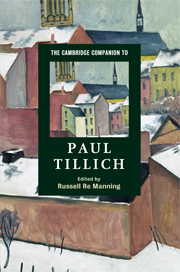Book contents
- Frontmatter
- Part I Standing within the theological circle
- Part II Theology of culture
- 8 Tillich’s analysis of the spiritual situation of his time(s)
- 9 Theology of culture and its future
- 10 Tillich’s theology of art
- 11 Tillich’s philosophy
- 12 Tillich’s ethics between politics and ontology
- 13 On the boundary of utopia and politics
- Part III Tillich in dialogue
- Bibliography
- Index
11 - Tillich’s philosophy
from Part II - Theology of culture
Published online by Cambridge University Press: 28 May 2009
- Frontmatter
- Part I Standing within the theological circle
- Part II Theology of culture
- 8 Tillich’s analysis of the spiritual situation of his time(s)
- 9 Theology of culture and its future
- 10 Tillich’s theology of art
- 11 Tillich’s philosophy
- 12 Tillich’s ethics between politics and ontology
- 13 On the boundary of utopia and politics
- Part III Tillich in dialogue
- Bibliography
- Index
Summary
In his autobiographical sketch, On the Boundary, Paul Tillich offers a striking account of his passionate interest in philosophy, which began in his final years at school and which would last throughout his life. This interest is shown not only in his numerous writings up to and including his main systematic work, the three-volume Systematic Theology, but also in his prolific academic teaching. As a young Privatdozent, Tillich lectured on the religious content of Western philosophy at the University of Berlin; in 1929 he was appointed the successor to Max Scheler at the University of Frankfurt am Main and held a chair in philosophy and sociology; and in 1940 he accepted a chair in philosophical theology in New York, which he held until his retirement in 1955. Tillich's theology is permeated by philosophical reflection that should never be reduced simply to philosophy of religion. Tillich not only accurately describes his own relationship to philosophy using the metaphor of a border, but also defines his philosophical thought with this same metaphor. Broadly speaking, there are three phases in Tillich's philosophical thinking. Firstly, there is his enthusiastic reception of the speculative idealism of Fichte and Schelling. This phase began in his student days and continued up to the First World War. The second phase, which began shortly before the end of the war, is characterized by a reshaping of the speculative philosophy of his pre-1914 theology and philosophy in terms of a new theory of meaning. The decisive characteristic of this phase can be seen in Tillich's employment of the concept of meaning as the basic category for the concept of religion. The third and last phase of his philosophical thinking is characterized by a concern with ontological questions.
- Type
- Chapter
- Information
- The Cambridge Companion to Paul Tillich , pp. 173 - 188Publisher: Cambridge University PressPrint publication year: 2009
- 1
- Cited by



